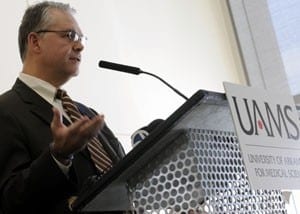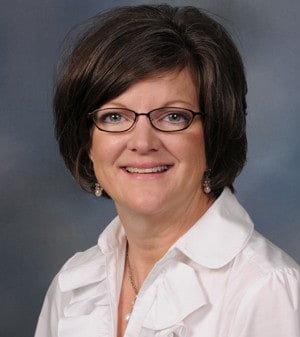New Translational Research Institute Bridges Gaps in Care
| 
UAMS’ Curtis Lowery, M.D., leads the new Translational Research Institute.

As executive director of the Translational Research Institute, UAMS’ Lisa Jackson oversees its day-to-day activities.
In an ideal world, everyone would have access to the best and very latest medical treatments available.
By establishing the Translational Research Institute, the University of Arkansas for Medical Sciences (UAMS) is working to make that ideal a reality.
The purpose of the Translational Research Institute, which developed from the UAMS Center for Clinical and Translational Research, is to:
• Reduce and/or remove barriers to conducting health care research.
• Foster collaborations with other universities and organizations to speed the development of new therapeutic agents.
• Support clinicians and scientists who perform research that leads to advanced medical treatments.
• Identify evidence-based approaches which lead to improved community health.
The Translational Research Institute is UAMS’ seventh institute and is directed by Curtis Lowery, M.D., chair of the College of Medicine’s Department of Obstetrics and Gynecology and director of the Center for Distance Health. It is funded largely by a $20 million federal Clinical and Translational Science Award, which UAMS received in 2009. The day-to-day operations of the institute are overseen by Lisa Jackson, a lawyer and registered nurse who serves as executive director.
Lowery is confident that the Translational Research Institute will significantly impact patient care throughout Arkansas.
“We will bring together a multidisciplinary network of basic scientists, clinical researchers, health care professionals, community leaders, patients and volunteers,” Lowery said. “Researchers across all colleges at UAMS will focus on translating science into improvements in patient care and community health.”
As the state’s only academic medical center, UAMS has a wealth of knowledge that could be translated into new drug treatments, novel surgical techniques and other advancements that lead to improved health of Arkansans. UAMS also has adopted excellent standards of patient care, integrating new practice-based guidelines into clinical care, and conducting community based research.
Jackson said that much of her work involves breaking down barriers and silos that impede the flow of research findings. This allows knowledge and expertise to reach health care providers and patients in other parts of the state.
The institute recently provided a mechanism for developing new collaborations with other universities and Clinical and Translational Science Award institutions.
The institute recently partnered with the University of California at San Francisco to jointly enroll research participants in a clinical trial of a new breast cancer drug. The ability to quickly enroll greater numbers of participants in clinical trials could reduce the time it takes to receive FDA approval of a new drug or device. The institute also is streamlining research at UAMS by developing an enterprise data warehouse to enable the use of rich clinical data for research purposes.
While medical data and tissue samples will remain heavily guarded, the new system will allow researchers to quickly access data that has been stripped of patient identifiers.
The Translational Research Institute is working to ensure that UAMS gets the biggest bang for its research investments. Health Affairs, a national journal, recently published the work of Holly Felix, Ph.D., M.P.A., a faculty member supported by the institute. Felix, an assistant professor in the College of Public Health, found that the Arkansas Medicaid program saved $2.6 million over three years by using community health workers to allow more elderly to remain in their homes. The study was funded by the Robert Wood Johnson Foundation, Enterprise Corporation for the Delta, and Medicaid, with support in the development of the paper coming from the institute.
This article has the potential to have a major impact on Arkansans, Jackson said, because taxpayers pick up the tab when the elderly, sick, or disabled are placed in institutional care.
The Translational Research Institute also is working to put mechanisms in place to ensure that discoveries made at UAMS can easily be transferred from the lab to the patient bedside. Jackson said she is determined to prevent such situations in which a scientist makes a discovery, publishes a paper, and then the discovery is put on a shelf.
“By having a central place like the Translational Research Institute, we can bring disparate parties together to get the discovery out of our academic center and into the community where it can have real impact,” she said.
The Translational Research Institute joins the Winthrop P. Rockefeller Cancer Institute, the Jackson T. Stephens Spine Neurosciences Institute, the Myeloma Institute for Research and Therapy, the Harvey Bernice Jones Eye Institute, the Psychiatric Research Institute, and the Donald W. Reynolds Institute on Aging.